The faster medical research moves the more quickly cures can be found for countless children’s diseases. But one of the greatest delays researchers face when trying to solve medical problems is finding enough patients to study. “Enrolling patients in a clinical trial to study a rare condition could take years,” said Mark Del Beccaro, MD, […]
On the Pulse
Being sick is never fun for a child, and spending time in a hospital can be especially difficult for families during the holidays. Children sometimes wonder if Santa will be able to find them come Christmas day. But at Seattle Children’s, there’s no need to worry. Every year, Santa makes a very special visit to […]
Once a year, the patient playroom at Seattle Children’s transforms. Usually it’s a place for patients to have fun and play with toys and games. But last Thursday, volunteers and Child Life staff members turned the room into every kid’s fantasy – a toy store where absolutely everything is free. Every holiday season, Children’s partners […]
The holiday season is a time where family and friends come together and often reflect on what they are most thankful for. It’s a time of celebration and joy, and for some, it’s also a time to give back. For 17-year-old Sophie Kuniholm, this time of the year is a combination of all those things. […]
This month, Travis Patterson and his 16-year-old son, Turner, are spearheading their seventh annual holiday toy drive for patients at Seattle Children’s. It’s just one way the Pattersons give back to the place that saved Turner’s life and changed Travis’s forever. Nearly 11 years after Travis first walked through Children’s doors, holding tight to a […]
There’s at least one thing that Seattle Seahawks fans and San Francisco 49ers fans can agree on…sick kids need help from anywhere they can get it. So when the 49er Faithful group pledged extra dollars from their recent fundraising effort to Seattle Children’s Hospital Foundation, we accepted. We might question their choice in football teams, […]
Last night, Seahawks cornerback Richard Sherman and his brother Branton Sherman surprised patients, families and staff at Seattle Children’s Hospital with a very special visit. Unable to attend “Blue Tuesday,” Sherman said he didn’t want to miss out on seeing the kids. He drove to the hospital right after practice with his brother in toe to […]
With frost appearing on our windshields and temperatures dropping, we find ourselves again nearing the height of the holiday season. And with only one week left to go before Christmas, holiday shoppers are on a tight deadline to find the latest deals and steals before time runs out. But there’s no need to worry because […]
On Dec. 14 of last year, 20 children and seven adults lost their lives in the senseless tragedy that took place at Sandy Hook Elementary School in Newtown, Conn. As we approach the anniversary of this horrific event, we remember and mourn the victims and the families who have been affected by this tragedy. No […]
‘Tis the season for mistletoe, gingerbread and carefully strung lights. It’s the most wonderful time of the year, but also a potentially dangerous one for children. And although festivities, candles and garland may make the holiday season more cheerful, with them come some serious safety concerns. Tony Woodward, MD, MBA, medical director of emergency medicine […]











